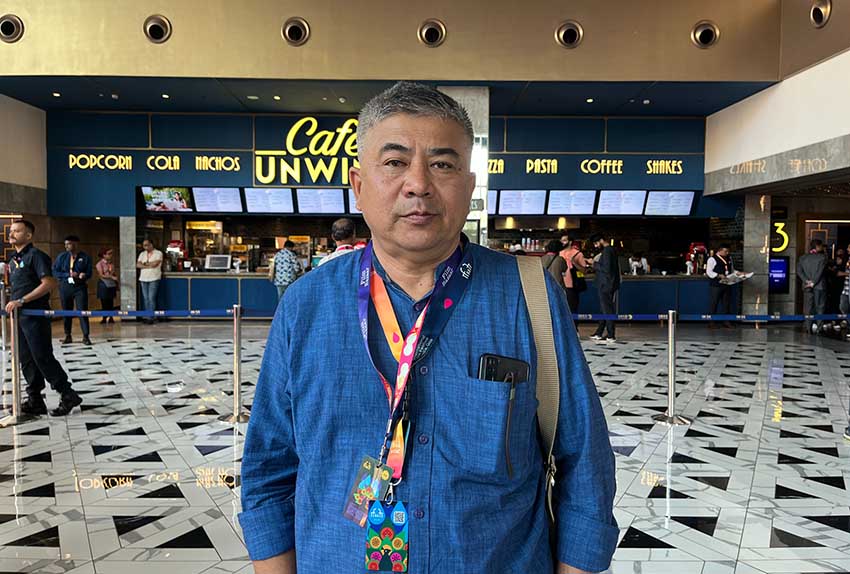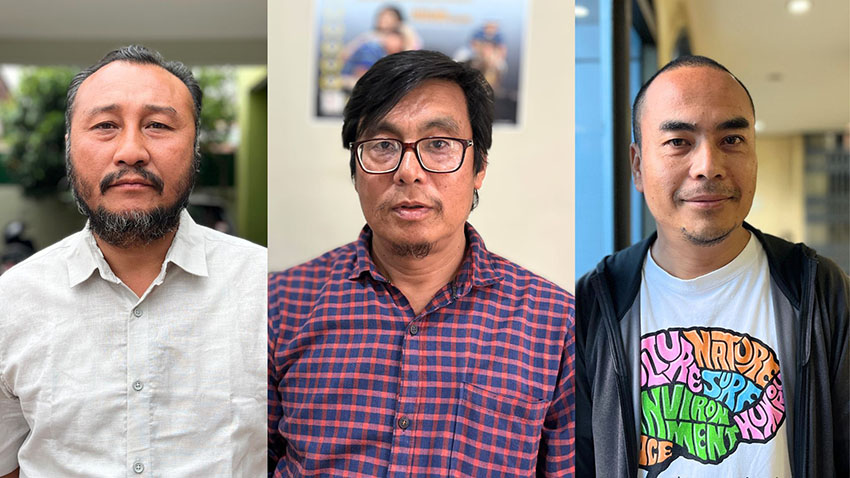At the recently concluded 55th International Film Festival of India (IFFI) in Goa, Manipur’s National Award-winning filmmaker Ronel Haobam served as one of the seven jury members for the Indian Panorama Non-Feature Film section. He was the sole representative from Northeast India on the panel. While many budding and aspiring filmmakers face challenges such as financial constraints that prevent them from participating in IFFI, Manipur’s spirit and contributions to cinema remain undeterred.
To share his experiences and insights from IFFI, Imphal Review of Arts and Politics (IRAP) engaged in an in-depth conversation with Ronel Haobam at INOX Panjim during the festival’s final week in November. In this discussion, he sheds light on the festival’s trends, the competitive landscape, and the evolving art of filmmaking.
Excerpts from the interview:
IRAP: What is the current situation of non-feature films in Manipur?
Ronel: Manipuri films have a long history of participating in the non-feature film category at IFFI. For instance, starting with Pabung Aribam Syam Sharma’s films, around three Manipuri films were featured in inaugural events at IFFI. However, this year, due to the unfortunate situation in Manipur, only one film was submitted, and it was not selected. Non-feature films, not just from Manipur but across India, are at a critical juncture. These films—encompassing documentaries, short fiction, and animations—struggle due to the lack of platforms for showcasing their work. Funding is another significant challenge, as most filmmakers rely on self-financing, support from civil society organizations, or NGOs. While advancements in technology have made filmmaking and editing more accessible, achieving a balance between technical excellence and artistic expression remains a substantial challenge.
IRAP: What did you experience about the selection process in the 55th edition of IFFI?
Ronel: The competition was very tough this year. Out of 262 films entered in the non-feature category, only 20 were selected for awards. The jury had to evaluate films based on their content and technical quality. Even if a film had a good story or script, it was hard to select it if it did not meet technical standards. The Indian Panorama section highlights the best films made in India within a year. The 20 selected films are showcased both across India and on global platforms, reflecting the highest quality of work from the country.
IRAP: What challenges do non-feature filmmakers face in India?
Ronel: There are many challenges. Non-feature filmmakers struggle with a lack of funding, as there are very few agencies or individuals willing to invest in documentaries, short-fiction, or animations. Most rely on personal funds, NGOs, or civil society groups. While it’s easier to film and edit nowadays, filmmaking is both a science and an art. A film needs to excel artistically and technically. Without this balance, even technically strong films fail to leave a lasting impression, which is a major difficulty filmmakers face.
IRAP: How important is it for Manipuri films to compete on an international platform like IFFI, and what steps can we take to improve them?
Ronel: The Indian Panorama section and the International Competition at IFFI are the most prestigious platforms for showcasing a year’s film production in India. Participating in IFFI is crucial because it serves as a gateway to other international platforms.
To make it to IFFI, significant support is required from the state government and all stakeholders involved in the filmmaking process. Cinema is a blend of science and art—neither works in isolation. Even with artistic excellence, cinema cannot succeed without technical support. Filmmakers need to thoroughly understand this medium.
Aspiring and budding filmmakers must continuously update their knowledge. They require financial and technical support, along with access to intensive training programs that enhance their skills. Additionally, they need awareness about existing support systems for filmmaking. Collaborating and supporting each other is vital to improving the quality of films in Manipur.
IRAP: When you look at the films entered and those selected, do you notice any specific themes or genres that filmmakers should focus on to increase their chances of selection at IFFI?
Ronel: In the documentary and short film categories, most selected films tend to address current and pressing issues such as women and child rights, human rights, exploitation of underprivileged groups, and other socio-political concerns.
In Manipur, we are currently facing numerous challenges. Filmmakers should delve deeply into these issues, moving beyond surface-level observations. It’s important to explore the core realities of these problems and present them in a way that not only highlights the challenges but also works toward positive and constructive solutions.
IRAP: What steps can the government or stakeholders take to improve filmmaking in Manipur, similar to what IFFI is doing with initiatives like Film Bazaar?
Ronel: The biggest challenge filmmakers in Manipur face is the lack of a robust support system. Our state is financially weak, and the current unrest has made the situation even more difficult, with people living in relief camps and basic needs being a priority. Despite these challenges, it’s essential to recognize that education must continue, and cinema, as an artistic and educational medium, also needs support to thrive.
The government must step up to provide this support, enabling Manipuri films to reach global platforms. While organizations like the NFDC and the Ministry of Information and Broadcasting are working to support non-feature films, the state government needs to play a more active role. Cinema is like a flower—it requires nurturing. Without support from the government and stakeholders, films cannot grow and achieve their full potential.
IRAP: What tips would you share with budding filmmakers who want to compete in IFFI’s Indian Panorama Non-Feature Section in the future?
Ronel: To budding filmmakers, I would say this: having been in the field for over 20 years, I’ve faced many challenges. However, today’s filmmakers have the advantage of easily accessing information through the internet and smartphones. They need to use this opportunity to explore every avenue and resource available to them.
Filmmaking should serve dual purposes—to entertain and to educate. Aspiring filmmakers must immerse themselves in research and exploration, finding unique stories and creative approaches they can try. Waiting for government or external funding isn’t practical. Instead, we need to collectively join hands, pool resources, and actively seek opportunities together.












